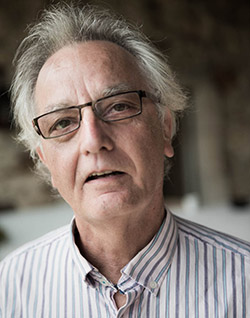 Professor Andrew Watson heads the Exeter Marine and Atmospheric Science group that specializes in making and interpreting ocean and atmosphere measurements to high accuracy, particularly of carbon dioxide and other greenhouse gases, chlorofluorocarbons and other ocean tracers. Andy was made a Fellow of the Royal Society in 2003. He is a recipient of the European Geophysical Union’s Nansen Medal for contributions to marine science (2003), and the Plymouth Marine Sciences medal (2009). Since 2009 he has been funded as a Royal Society Research Professor. He is currently a member of the Science Advisory Board of the Centre for Climate Dynamics in Bergen, Norway and the Steering Committee of the National Oceanography Centre Association.
Professor Andrew Watson heads the Exeter Marine and Atmospheric Science group that specializes in making and interpreting ocean and atmosphere measurements to high accuracy, particularly of carbon dioxide and other greenhouse gases, chlorofluorocarbons and other ocean tracers. Andy was made a Fellow of the Royal Society in 2003. He is a recipient of the European Geophysical Union’s Nansen Medal for contributions to marine science (2003), and the Plymouth Marine Sciences medal (2009). Since 2009 he has been funded as a Royal Society Research Professor. He is currently a member of the Science Advisory Board of the Centre for Climate Dynamics in Bergen, Norway and the Steering Committee of the National Oceanography Centre Association.
Exeter Atmospheric and Ocean Science
© The Open University
Rate and Review
Rate this audio
Review this audio
Log into OpenLearn to leave reviews and join in the conversation.
Audio reviews